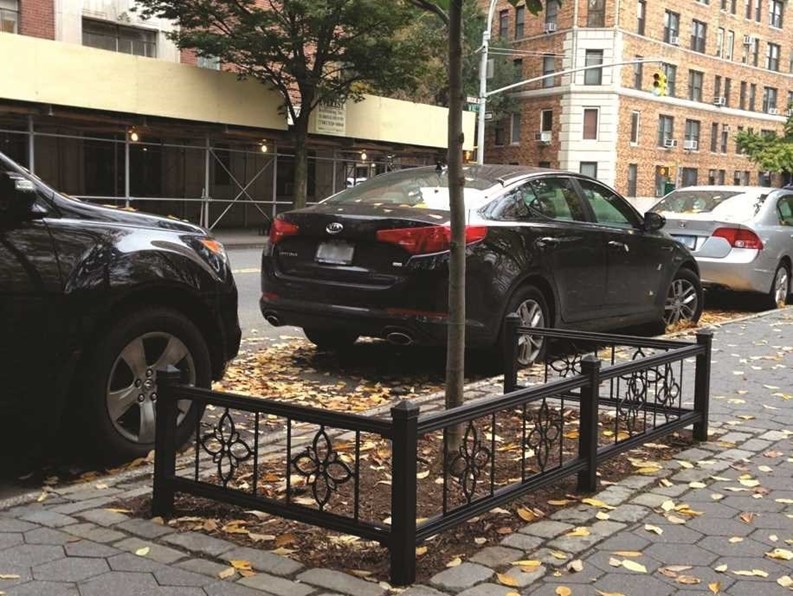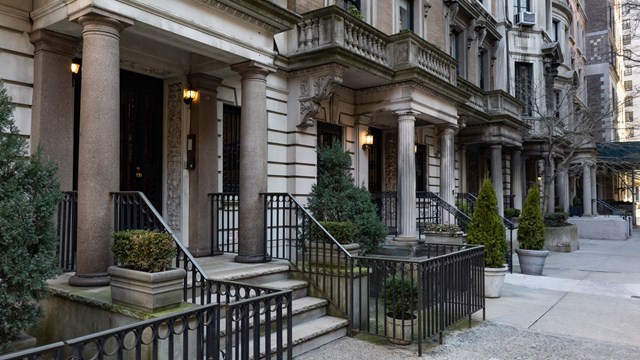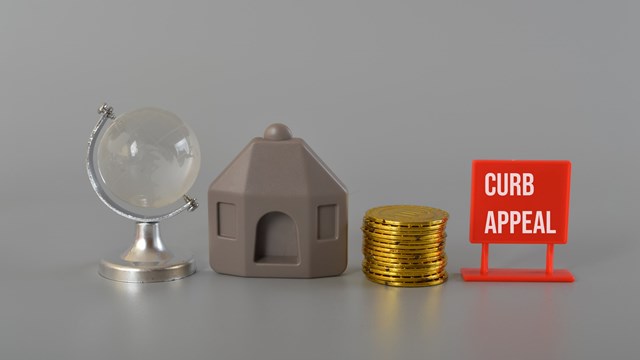An old time-worn saying ‘that you’re only as good as your first impression’ is paramount in how your co-op or condo building is perceived at street level. The curb appeal factor cannot be discounted when people pass by your building and see that its awnings are a little weathered or outdated, street garbage and debris is piling up on the sidewalk, and maintenance has been woefully neglected.
Especially in times of economic stress, co-op and condo boards and buildings try to maximize the curb appeal of their property in order to compete in a market that has begun to rebound but has a long road to recovery ahead. While these makeovers need not cost thousands of dollars, it's a little more complex than just planting some geraniums and calling it a day. How your building or association presents itself to passers-by and the world at large—it's curb appeal—has a direct effect on resident morale, pride of ownership, and even property values.
The anticipation of putting your own touch on the place, decorating it the way you want because it’s your property is one of the perks of home ownership. However, with the perks come responsibilities. You also need to take care of your new asset too—not just inside, but sometimes outside as well.
Nobody wants to live next to the eccentric lady in 2B who has disregarded the ‘no gnomes’ rule and has kitschy ceramic figurines poking out of every single shrub and flowerbed outside her front door—or the neighborhood political super-activist whose windows, lawn, and every other stationary surface is festooned with campaign signs, decals, or flags.
Living in close quarters with scores—maybe hundreds—of other people is hard enough without the added tension of poor exterior upkeep. So before you add your own string of multicolored lights to your front door or plant a gigantic plastic frog in the tree pit in the courtyard or by your front stoop, it’s important to learn what is and isn’t allowed in terms of décor and cleanliness and what repercussions there are for slacking off on maintenance or disregarding the rules.
Play By the Rules
Honestly, this really should be a short article because in truth, co-op and condo residents are generally forbidden from altering or decorating any part of the building or development outside their own individual unit. “They aren’t allowed to touch the outside, and any exterior work that needs to be done is done by a professional,” says Dennis Greenstein, a partner in the New York City-based law firm of Seyfarth Shaw LLC.
However, if you are fortunate to live in a building or homeowners association that allows some decorating or remodeling outside your front door, those allowances are laid out explicitly in the set of rules you received when you bought your unit. “The bylaws and the proprietary lease are going to regulate the type of repairs and alterations,” says Greenstein. “This goes for anything you want to put in the window too, even though it’s on the inside of your property. Generally the courts will support these provisions.”
Even if your documents contain allowances for certain adjustments, you will probably need approval. “Residents can’t touch the outside of the unit without the approval of the board of directors or managers,” says Marc H. Schneider, founding partner of the Garden City-based law firm of Schneider Mitola LLC. “No co-op is going to let them do anything on the exterior. Nobody can alter the building. In a condo association, there are some instances where the board may let you do something to the outside of the unit, without the approval of the respective board.”
If building is allowed on the exterior of your condo property, Greenstein says that the project would be subject to conditions. “Let’s say you want to build a patio. You must look at the bylaws to see what the conditions are to build it. You would probably need to get approvals from the municipalities that govern the filing as well as other things you need to do.”
Flying High
In 2005, the U.S. Congress passed the “Freedom to Display the American Flag Act of 2005” which states that “A condominium association, cooperative association, or residential real estate management association may not adopt or enforce any policy, or enter into any agreement, that would restrict or prevent a member of the association from displaying the flag of the United States on residential property within the association with respect to which such member has a separate ownership interest or a right to exclusive possession or use.”
The Act does allow an association to adopt “any reasonable restriction pertaining to the time, place, or manner of displaying the flag of the United States necessary to protect a substantial interest of the condominium association, cooperative association, or residential real estate management association.”
“The condo board can’t prohibit the unit owner of displaying the flag, but they can make determinations as to when they fly it, as well as what other things unit owners can display,” says Jack Lepper, managing partner of the Manhattan law firm of Kagan Lubic Lepper Finkelstein & Gold, LLP. “However, whatever the rules and regulations are must be applied evenly to all shareholders and unit owners. What I tell many folks, when you buy into a co-op or condo you are voluntarily choosing to join a club. The rules are often set by those who govern. You have to accept that you are subject to those rules as long as you’re not being singled out.”
Image is Everything
“Curb appeal absolutely sets the tone for the entire building image,” says Marilyn Sygrove, president of Sygrove Associates Design Group Inc. in Manhattan. “Number one, how well the building is maintained, how current the materials and design are, and it gives you a sense of quality of the building. If you are in the competitive real estate market and your snow is shoveled, the door hardware is shiny and the glass is clean...that is the image that you want to project in a well-run, well-maintained building.”
In order to convey the image of a successfully managed and desirable building, Sygrove suggests attending to all aspects of the exterior. She explains that curb appeal encompasses many aspects of the building.
“Curb appeal is the facade of the building at eye level,” she says, “from the condition of the sidewalk, the awning, any plantings or landscaping and entry doors, plus whatever you can visually see into the building—for instance if there is a large window that looks into the lobby.”
Amid the things to consider when putting a home up for sale, there are a few professional designers and home stagers feel are important. Many are common sense issues that people often overlook when preparing a property to be shown.
So Play Nice
Just because a set of rules has been made doesn’t mean that all residents will actually follow them. People break rules all the time. Some residents might not take ‘no’ for an answer and want to challenge what the rules say. Perhaps Mrs. Gnome Lady says that her little buddies are a form of creative expression and removing them violates her constitutional rights? Outlandish? Not really.
“The most common challenge from residents is saying that it violates their constitutional rights,” says Greenstein. “But again, people buy into the association and they agree to provisions in the deed. Rarely are there instances—unless it’s a discriminatory violation of the law—that the courts would reverse a decision by the board.”
Laws are often laid down for a reason—and it’s not to make your home ownership unpleasant. In some cases, it’s to protect the association from damage or breaking warranties.
“For example, many buildings are undergoing terrace restoration,” says Lepper. “There’s a coating on the surface of the restoration and the warranty is very specific as to what can be placed on those terraces. You need to strictly adhere to it or you are jeopardizing a warranty or guarantee, so boards want to be careful of the restrictions they place on their unit owners and prepare their residents for whatever restrictions may be in advance of the work done.”
When it comes to flying the flag, Schneider says that the state can’t enact a state law that’s contradictory to a federal law. “But they can challenge that if they don’t like the decisions and the laws,” he says.
Any Recourse?
If a resident does feel wronged, Schneider suggests writing to the board and mediating the dispute to solve it amicably. “It depends on what the request is,” he says. “People want to update their homes but the board is empowered to deny that type of request. The board has the right to fine people for failing to comply, which becomes a monetary obligation. They then can move to put a lien on a condo unit owner and, if enough time goes by, they can foreclose on the unit.”
However, if needed to be, bylaws can be amended. “Consult with an attorney in drafting the condo documents,” says Greenstein.
When it comes to doing what you want on your property in an association, the old adage, ‘rules are meant to be broken,’ simply does not apply.
Lisa Iannucci is a freelance writer and a frequent contributor to The Cooperator.










Leave a Comment